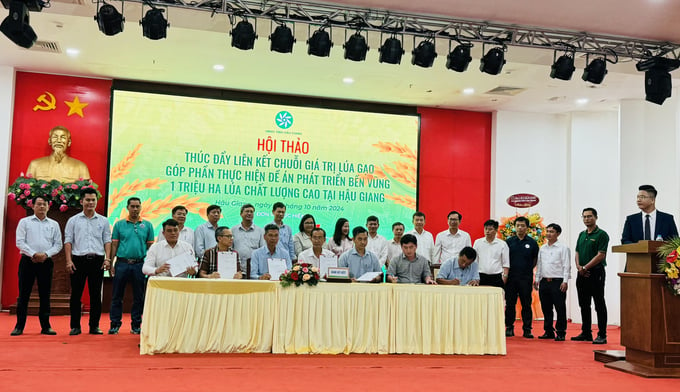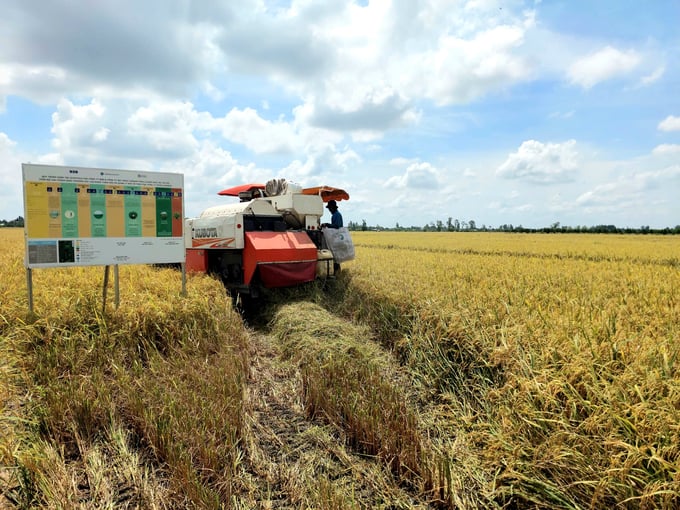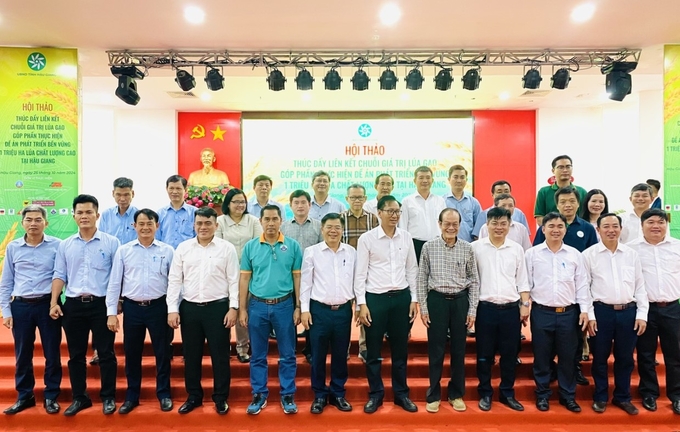May 18, 2025 | 20:56 GMT +7
May 18, 2025 | 20:56 GMT +7
Hotline: 0913.378.918
May 18, 2025 | 20:56 GMT +7
Hotline: 0913.378.918

Tran Minh Tien, CEO of Net Zero Carbon (front, second from left), joins other business leaders in signing a memorandum of understanding with Xa No Mekong Rice Cooperative Alliance (Hau Giang Province). Photo: Kim Anh.
On December 12, 2023, Hau Giang became the first province selected by the Ministry of Agriculture and Rural Development to host the launch of the "Sustainable Development Project for one million hectares of specialized, low-emission high-quality rice in association with green growth in the Mekong Delta region by 2030."
This event holds significant importance for the rice sector in Hau Giang Province and the Mekong Delta region as a whole. The initiative aims to bring direct benefits to rice farmers, contribute to climate change mitigation efforts, reduce greenhouse gas emissions, and enhance the value of the rice supply chain through sustainable practices.
To date, Hau Giang has completed the selection and designation of regions that will participate in the project. Until 2025, the province will focus on consolidating approximately 28,000 hectares currently under the management of the Sustainable Agricultural Transformation Project (VnSAT). By 2030, the province plans to expand the designated area to 46,000 hectares across six of the province’s eight districts.
Hau Giang has maintained an active approach to establishing business partnerships with the aim of implementing pilot models at the provincial and district levels since the beginning of 2024. Subsequently, the total pilot model area has reached approximately 180 hectares. These models prioritize promoting advanced technical practices such as alternate wet and dry irrigation, the "one must, five reductions" approach, and the SRP-compliant sustainable rice production process.
However, the province faces significant challenges in fostering strong, sustainable partnerships with the business community and effectively establishing a linkage between production and consumption.
In response to these issues, the Hau Giang Provincial People’s Committee organized a workshop on October 25 titled "Establishing the Rice Value Chain to Support the 1 Million Hectares of High-Quality Rice Project." Accordingly, the project aims to strengthen collaboration among participants in the rice value chain to support this initiative.

A look at one of the low-emission rice cultivation models launched by Net Zero Carbon Corporation in Chau Thanh A District, Hau Giang Province. Photo: Kim Anh.
Furthermore, local governments within the province have focused on identifying high-quality, low-emission rice farming solutions, developing frameworks for emissions measurement, reporting, and certification, and assigning responsibilities to all stakeholders.
Consequently, Net Zero Carbon has introduced an alternating wet and dry (AWD) smart rice farming model in Hau Giang Province to support local rice production activities. Additionally, the BNS farming process, implemented in collaboration with BSB Nano Technology Corporation, aims to reduce the use of fertilizers and pesticides, thereby enabling farmers to lower production costs and increase crop yields. Notably, stakeholders can closely monitor the entire rice growth cycle through the Spiro Carbon satellite system.
According to Tran Minh Tien, CEO of Net Zero Carbon, the integration of modern monitoring and measurement technologies within the BNS farming process optimizes yields for farmers and reduces greenhouse gas emissions, which ultimately provides both economic and environmental benefits.
CEO Tran Minh Tien noted that existing rice production models in Hau Giang Province currently employ advanced technical procedures to maintain export-standard quality and enhance local rice products' competitiveness in international markets.

With immense support from the business community, Hau Giang Province aims to achieve 46,000 hectares of high-quality rice by 2030. Photo: Le Hoang Vu.
Net Zero Carbon sees this development as a significant step toward realizing the goal of 1 million hectares of high-quality rice, thereby developing Vietnam’s agricultural sector toward sustainability and efficiency.
On this occasion, Net Zero Carbon, in collaboration with five businesses specializing in agricultural input supply and rice product consumption, signed a memorandum of understanding with the Xa No Mekong Rice Cooperative Alliance. According to the Memorandum, participating businesses will represent cooperative members in rice production and sales.
Under the agreement, the companies commit to providing essential inputs (such as seeds, fertilizers, and pesticides), offering support for low-emission rice cultivation technologies, promoting organic-oriented production, and implementing effective farming solutions to lower investment costs, improve economic returns, and reduce emissions.
The production linkage in smart rice farming models that utilize alternate wet and dry (AWD) irrigation techniques will promote the strengths of each participating business. Consequently, the models will help foster an effective farming solution that meets several key criteria, including reducing costs, enhancing crop health, increasing yields, lowering emissions, and protecting the environment.
The smart AWD rice farming process is expected to create breakthroughs in sustainable rice cultivation across various regions nationwide.
Translated by Nguyen Hai Long

(VAN) Minister of Agriculture and Environment Do Duc Duy held a meeting with Soopakij Chearavanont, Chairman of C.P. Group, on May 15.
/2025/05/16/3800-0-nongnghiep-143756.jpg)
(VAN) Suntory PepsiCo Vietnam coordinated with the Ministry of Education and Training to implement an education program on water conservation, reaching nearly 1 million primary school students nationwide.

(VAN) Vietnam’s TH Group officially put its high-tech fresh milk processing plant into operation in the Russian Federation, marking a historic moment as the first TH true MILK cartons were produced in Russia.

(VAN) Use of high-quality broodstock and biotechnology is regarded as the most effective approach to ensuring sustainable and economically viable shrimp aquaculture ahead of climate change and the emergence of increasingly intricate disease patterns.

(VAN) Carbon farming is a form of agricultural practices that helps absorb more greenhouse gases than it emits, through smart management of soil, crops, and livestock.

(VAN) This is a key content of the Memorandum of Understanding recently signed between the Vietnam Fisheries Society and Kunihiro Inc of Japan.

(VAN) To achieve the goal, local authorities and businesses in Kon Tum province have fully prepared the necessary conditions for the new Ngoc Linh ginseng planting season.